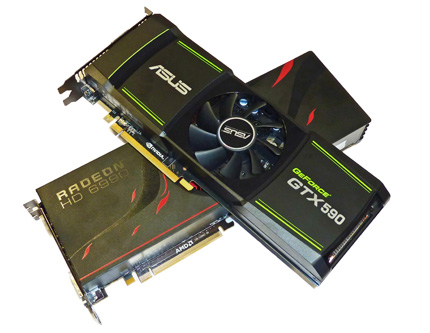Prove it, says AMD
GeForce GTX 590 is the fastest, says NVIDIA
NVIDIA has furnished its GeForce GTX 590 dual-GPU card with the enviable title of world's fastest graphics card. It makes this claim by stating internal testing shows the "Performance gain of GTX 590 over Radeon 6990 across all games and benchmarks was eleven percent on average."
Drew Henry, GeForce GPU general manager, goes on to say: “The GTX 590 is the best dual GPU product ever built.” Reinforcing the GTX 590's high-performance attributes, he comments: "“With leading performance, support for multi-monitor 3D gaming, Quad SLI, and an acoustic envelope that begs to be heard for how quiet it is, the GTX 590 epitomizes what a perfect dual graphics card looks, performs, and sounds like.”
Now, there is absolutely no question the GeForce GTX 590 is the fastest-ever graphics card built by NVIDIA, though a certain company take umbrage with the claim of 'world's fastest'.
You see, arch-rival AMD is adamant that NVIDIA is espousing half-truths in its bombast marketing, and the Radeon marketing folk are vexed enough to call NVIDIA up on its claim of performance hegemony.
AMD: prove it, don't just say it
Dave Erskine, senior public relations manager for AMD graphics, has personally issued a challenge to NVIDIA. He wants the green team to "prove it, don’t just say it" by divulging the exact methodology by which NVIDIA has come to the attention-grabbing conclusion of world's fastest.

Rather, he believes the Radeon HD 6990 is the fastest graphics card around and backs up the claim by referencing scores in the 'industry-standard' 3DMark 11 benchmark, where the Radeon beats the GeForce by around 10 per cent, more if in turbo mode.
In fact, he goes on to list a number of popular review-focussed websites that bear this point out, and it's not lost on me that HEXUS is one of them. For complete transparency, HEXUS had no prior knowledge that Dave Erskine was going to link to the review in his blog.
Coming back to matter in hand, I have little concern that NVIDIA will be able to provide the results on which its claim is founded, but the whole argument runs somewhat deeper than that.
Pick and choose
The very exercise of benchmarking games and arriving at a coherent conclusion is fraught with danger. Drivers provide (literally) game-changing performance boosts - see the gains AMD made from Catalyst 10.9 to 11.4 preview - and one can choose any number of benchmarks to show your hardware in a particular light. Spend a significant amount of time and resources with a games developer and your graphics cards should run faster on their games than the competition's. Hardware is only one part of the story, clearly.
Labouring the point, play only StarCraft II at high resolutions and high IQ settings and the GTX 590 trounces the HD 6990. That's true if you play HAWX 2, Batman: Arkham Asylum and Lost Planet 2, according to NVIDIA, yet AMD can claim performance leadership in titles such as Metro 2033, F1 2010, and Aliens vs. Predator.
My own benchmarks give the Radeon HD 6990 the edge, evaluated over six current games, but it's easy to see how a different conclusion can, and has, been reached by other websites.
It's also not escaped my attention that both parties heavily optimise drivers for games used by well-read websites, though AMD and NVIDIA will claim that the games' popularity drives focus.
Nebulous conclusions
See, nothing is absolutely clear-cut in the nebulous world of graphics cards. This isn't a timed race, where you can categorically say Usain Bolt is faster sprinter than me over 100m. Rather, results from a wide range of games are open to interpretation and can be skewed to meet a certain bias.
So which is the fastest graphics card in the world, then? I can only answer this if the results are based on mutually agreed-upon testing. If it's 3DMark 11, AMD's faster; if it's some other metric, who knows.
Actually, I'm interested to see if NVIDIA takes Dave Erskine's bait and rises to the challenge of defending its statement. Does it need to? Would you? Let me know your thoughts in the HEXUS.community.













